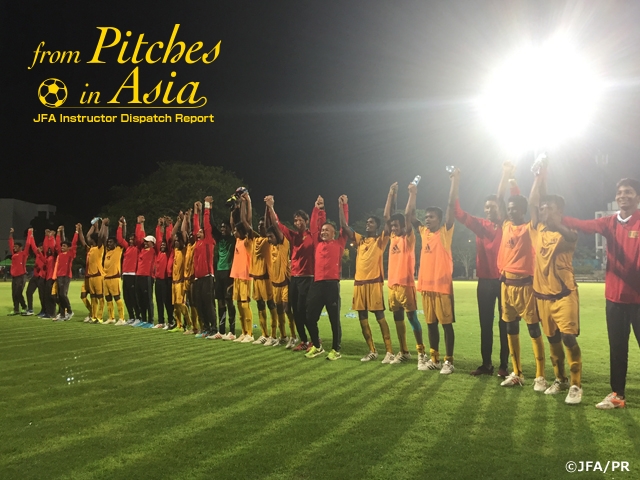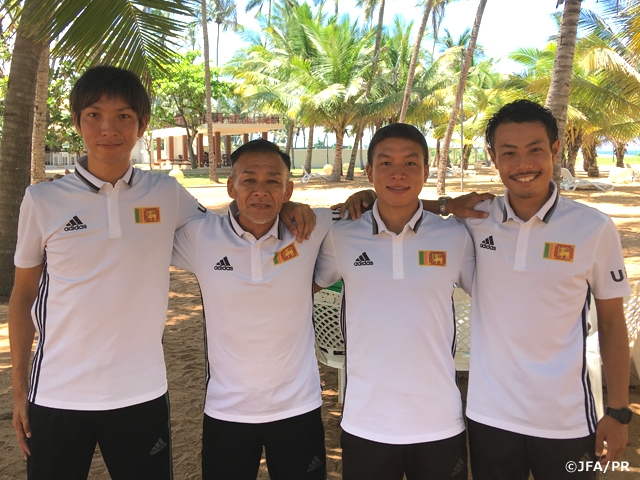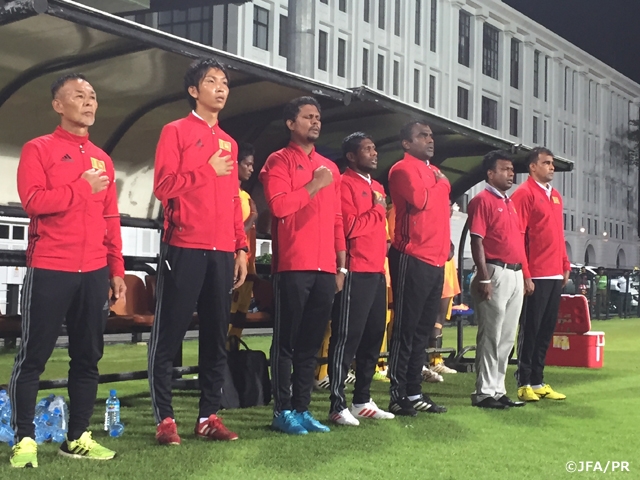NEWS
From Pitches in Asia – Report from JFA Coaches/ Instructors Vol.26: SUZUKI Chikashi, Sri Lanka U-16 National Team Coach and Supervisor of National Academy
11 April 2017

The 26th edition of “From Pitches in Asia”, in which we introduce the viewpoints of instructors active in Asian countries, is written by SUZUKI Chikashi, who serves as U-16 National Team Coach and Supervisor of National Academy in Sri Lanka.
Opening of National Academies
Short, medium and long-term plans are necessary for football development, and player development is an important part of this project which requires long-term planning. Based on the ideas of JFA's "National Training Centre System," we finally managed to open an academy in April in coordination with local schools after a series of meetings with the Football Federation of Sri Lanka (FFSL). These days, I have been spending most of my energy in developing a foundation for the new academy system.
In the academy located in Jaffna, a northern province of Sri Lanka, there are nine different categories separated by age ranging from 10 to 18, and each age group is comprised of 30 players. Currently, four artificial-turf fields are being constructed across the nation with the support from FIFA, and once they are completed, we will be ready to open new academies in Colombo, Hatton, Matara and Badulla. Those efforts will enable us to instruct 270 young prospects at each training centre and a total of 1350 players at the five academies nationwide. Eventually, we are planning to hold monthly interschool matches whereby players from different academies can compete against and learn from each other.
Synergy through Collaboration with JICA Sri Lanka
These activities are carried out in collaboration with the Sri Lanka office of Japan International Cooperation Agency (JICA). Most JICA football staff members are on duty in regional towns and cities, and they are all knowledgeable about the football situations in the region as well. We form a mutually beneficial relationship with JICA, as we all benefit from an exchange of accurate information. While JICA provide us with the pertinent information regarding the local conditions, working together with the Sri Lanka National Team will enable the JICA staff to understand the difference between the football levels of the local and national team players and furthermore it will enable them to realise what is lacking in their respective regions.
Another merit from participating in the national team activities is that the JICA members can learn various coaching methods for their players. As a result, this exchange has become an important ‘on-the-job’ learning course for football staff as well. During the U-16 international tournament just recently held in Sri Lanka, we offered a coaching workshop whereby the JICA staff supported this program as interpreters for local coaches. This event enabled them to form a communication network with domestic coaches and by sharing information about the workshop they can accelerate the development of football in their respective regions. We believe the collaboration with JICA is an indispensable part of our future efforts to foster football in Sri Lanka.

SPORT FOR TOMORROW (SFT) South Asia - Japan U-16 Football Exchange Programme
A four-nation U-16 international tournament took place in March in Sri Lanka, and national teams from Nepal, Bhutan, Japan and Sri Lanka participated in this competition. This special exchange was organised with support from the JFA, who was commissioned by the SFT (“Sport For Tomorrow”) programme of the Japanese government.
Our preparation began with JFA delegates visiting Sri Lanka last November to inspect the local stadiums, hotels and other football facilities. After their visit, we had approximately four-months to prepare for the tournament, but only completed our preparation just before the competition began. This was our first time to host an international tournament, and this event has provided us with an important learning experience of organising a tournament.
Concurrently, we started our preparation for the U-16 Sri Lanka National Team participating in the tournament. Using ‘players with high work-rate to compete effectively’ as our criteria, we selected the national squad members from a pool of 500 potential candidates before holding a camp in preparation for the opening match against Japan. We assumed that over 80% of this match will be spent on defence, and practiced focusing on defending, counter-attacking and scoring from set pieces. Furthermore, we held meetings with the FFSL to assemble young coaches for the national team. Many young coaches do not have the chance to work with the national team, and we believed that this experience would be important for the future development of football in Sri Lanka.
Additionally, JICA staff and coach of U-14 Sri Lanka National Team NAKANO Mamoru also joined the team as one of our staff members. Coach Nakano is fluent in Sinhalese, and his ability to communicate in the local language helped us instil the team tactics to the players.
The Sri Lanka national team played an excellent game against Japan capitalising on their individual characteristics, but lost 1-3 in the end. We believe they gained significant confidence after a highly-contested match against the potent Japanese side. However, we struggled against Bhutan and Nepal and became aware of the lack of effective attacking tactics along with poor off-the-ball movements and more importantly inadequate ball controlling skills. These are some of the challenges we need to work on to improve the team and thus the football in Sri Lanka.
Approximately 70 coaches from the participating countries and local teams across Sri Lanka attended the workshop organised by the JFA during the tournament. While learning from practical training courses and lectures, this seminar has become a precious opportunity to understand the need for simultaneous development of the national teams, coaching staff and youth players. Furthermore, exchanging ideas and sharing information about the current situations of football in South Asia with Bhutan National Team Coach LEE Song Jun and Technical Director of Nepal TAKEDA Chiaki, who are also being dispatched by JFA, were also beneficial for the future developments of coaching in Sri Lanka.
World-known Ceylon tea is made beautifully by artisans called "Master Blender" after picking just young leaves at the tip of tea trees growing every day. In football, blending such young leaves is a role of the coaches. I would like to consider my work as a "Master Blender" of future prospects and at the same time develop future “Master Blenders” to accelerate the development of football in Sri Lanka as well.

Related News
-
2017/03/02
From Pitches in Asia - JFA Instructor Dispatch Report vol.25: Bhutan National Team Goalkeeper Coach HANITA Atsushi

-
2017/01/25
From Pitches in Asia – Report from JFA Coaches/Instructors Vol.24: KANEKO Takayuki, Technical Director in Jiangsu Province, China

-
2016/12/14
From Pitches in Asia – Report from JFA Coaches/Instructors Vol.23: NAKAMURA Kyohei, Coach of Turkmenistan National Futsal Team

-
2016/11/16
From Pitches in Asia – Report from JFA Coaches/Instructors Vol.22: LEE Song Jun, Coach of U14/U-17 Bhutan National Team

-
2016/10/21
From Pitches in Asia – Report from JFA Coaches/ Instructors Vol.21: GYOTOKU Koji, Coach of Nepal National Team

Latest News
-
National Teams
2026/02/12
U-17 Japan National Team squad & schedule - Prayer for Peace; Hiroshima International Youth Soccer Games 2025 (2/17-23@Hiroshima)

-
National Teams
2026/02/12
Nadeshiko Japan (Japan Women's National Team) squad & schedule - AFC Women's Asian Cup™ Australia 2026 (2/23-3/22)

-
National Teams
2026/02/09
U-16 Japan Women's National Team short-listed squad & schedule - Training Camp (2/16-19@Okayama)

-
Referees
2026/02/05
JFA launches "Development Group" in refereeing Mike Riley signed as Referee Development Director

-
National Teams
2026/02/04
U-16 Japan National Team squad & schedule - 4 Nations Tournament (2/9-19@Algarve, Portugal)



